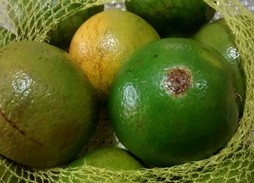Research Highlights
Prof. dr. Dirk-Jan Scheffers

Brazil is the major producer of orange juice concentrate and responsible for over half the juice consumed worldwide. The sweet orange juice industry is constantly threatened by diseases, such as citrus canker, that require the use of toxic metals (e.g. copper) and other pesticides to enable profitable production. The reduction of pesticide use is of great importance for a sustainable citriculture, as well as for the production of other crops. Citrus canker is a disease that affects all the commercially important varieties of citrus, and is endemic in all major citrus producing regions in the world except Europe. The disease affects trees and fruit, and causes great economic losses.
Together with academic and industrial partners in Brazil and the Netherlands, we focus on the control of the bacterial pathogen Xanthomonas citri, the causal agent of citrus canker, by synthesizing and testing environmental-friendly compounds, less toxic than copper, that are able to protect citrus plants from the infection by X. citri. We specifically focus on phenolic compounds, and have characterized the mode of action of several series of these compounds, which are now being tested in the green house and in a small-scale field test. Key points to develop are (1) the delivery of the compounds using microgels or other adjuvants which will allow controlled substance release and adherence to the plants and (2) test the effect these compounds have on the soil. Our aim is the development and implementation of novel strategy to combat citrus canker by protecting or curing citrus trees, using biodegradable compounds that can be synthesized, at least in part, from agricultural waste products.1 The techniques used are also employed to characterize other antibacterial compounds with potential for medical applications.2
1. Cavalca, L. B. et al. (2021) Benzenetriol-derived compounds against Citrus canker. Molecules 26, doi:10.3390/molecules26051436.
2. Chakraborty, P. et al. (2021) An organogold compound as potential antimicrobial agent against drug-resistant bacteria: initial mechanistic insights. ChemMedChem 16, 3060-3070; DOI:10.1002/cmdc.202100342.
| Last modified: | 20 October 2023 3.13 p.m. |
